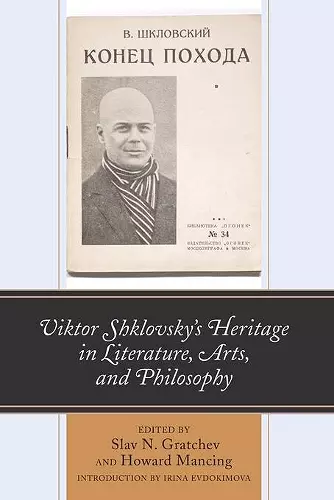Viktor Shklovsky’s Heritage in Literature, Arts, and Philosophy
Howard Mancing editor Slav N Gratchev editor Irina Evdokimova editor
Format:Paperback
Publisher:Lexington Books
Published:4th Mar '22
Currently unavailable, and unfortunately no date known when it will be back
This paperback is available in another edition too:
- Hardback£95.00(9781498597920)

This book examines the heritage of Victor Shklovsky in a variety of disciplines. To achieve this end, Slav N. Gratchev and Howard Mancing draw upon colleagues from eight different countries across the world—the United States, Canada, Russia, England, Scotland, the Netherlands, Norway, and China—in order to bring the widest variety of points of view on the subject. Viktor Shklovsky’s Heritage in Literature, Arts, and Philosophy is more than just another collection of essays of literary criticism: the editors invited scholars from different disciplines—literature, cinematography, and philosophy—who have dealt with Shklovsky’s heritage and saw its practical application in their fields. Therefore, all of these essays are written in a variety of humanist academic and scholarly styles, all engaging and dynamic.
Viktor Shklovsky (1893–1984) was a powerhouse of early Soviet literary and cultural theory. He was also one of the earliest Soviet film critics, and from the 1920s through the 1970s he worked as a screenwriter for Goskin (i.e., USSR State Committee for Cinematography). This collection of 16 essays examines all facets of Shklovsky’s legacy on literature, criticism, cinematography, and philosophy. Unlike most scholarship on Shklovsky, the present volume treats not only his best-known works—for example, Art as Device (1917) and Theory of Prose (1925)—but all his contributions and his influence into the late 1970s. The book’s three parts focus on Shklovsky’s three main areas of investigation: literature, the arts, and philosophy. Particular focus is placed on his legacy in the broad Soviet cultural landscape: on early cinema, on philosopher Yuri Tynyanov, on the Soviet intelligentsia, and on world literature. As one would expect, several essays explore the impact of Shklovsky’s concept of defamiliarization on other authors/works and contexts, from Lewis Carroll’s Wonderland to Cervantes’s Don Quixote. This is a book for specialists interested in expanding their knowledge of Shklovsky and his impact beyond his well-known work.
Summing Up: Recommended. Graduate students, researchers, faculty.
Engaging, uneven, and seminal - very much reflecting the spirit of Shklovsky's own work - , this wide-ranging collection revisits some of his key ideas and tests their relevance today. -- Galin Tihanov, George Steiner Professor of Comparative Literature, Queen Mary University of London
Of all the Petrograd Formalists, Viktor Shklovsky wrote the most brashly, loved the most lyrically, coped most pragmatically with the horrors of his era, and lived the longest. As critic, creative writer and closet lay philosopher, Shklovsky was—as one contributor to this volume puts it—always a public figure in history but careful “to avoid being one with it.” It took hard work to survive. To make a living, Shklovsky edited banned film scripts to get them past the censor and ghostwrote books for less gifted colleagues. As he confessed to his Italian interviewer Serena Vitale near the end of his life, there were only two things he never wrote: poetry, and denunciations.
This wide-ranging volume celebrates Shklovsky’s legacy in thing theory, feminist formalism, defamiliarization in film, the limits of the translatable, and it provides newly-sensitized readings of world literature from Cervantes through Tolstoy, Lewis Carroll, Pynchon, and Borges. A fine tribute to Soviet Russia’s most cosmopolitan monolingual critic. -- Caryl Emerson, Princeton University
Victor Shklovsky, though among the most influential literary theorists of the 20th century, remains, paradoxically, little known. This volume brings together Russianists who contextualize Shklovsky's achievement alongside scholars in other fields—most notably Hispanists—who attest to its impact. If you use the concept of 'defamiliarization' in your classes or publications—and who doesn't?—you will want to read this book. -- William Childers, Brooklyn Col
ISBN: 9781498597944
Dimensions: 219mm x 154mm x 21mm
Weight: 426g
308 pages